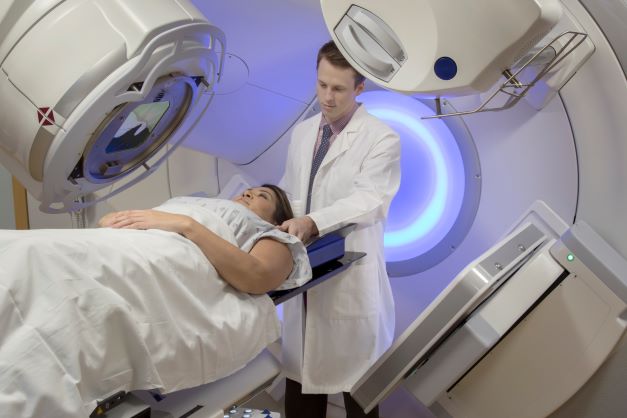Reducing trauma for radiotherapy patients

The London Clinic is pioneering temporary markings as a replacement for alignment tattoos to help reduce the lasting trauma of radiotherapy treatment.
The London Clinic is one of the UK’s largest independent hospitals, providing medical care to thousands of patients every year and treating a range of diseases and conditions including cancer. As a charity, it continually reinvests in its facilities and technology, seeking to offer the latest advances in cancer diagnostic, treatment and support services.
However, it was not pioneering new technology that saw The London Clinic win the 2022 CHKS Top Hospitals award for innovation. Rather, it was their out-of-the-box thinking, allowing radiotherapy patients the options of having non-permanent alignment tattoos, which caught the attention of the judges.
Challenging the requirement for permanent alignment markings on patients receiving radiotherapy treatment
In its cancer management, The London Clinic declares that it is committed to giving patients choices in their care and always seeks to apply the latest technologies available to facilitate this. Radiotherapy provision is an innovative area, but one aspect of treatment has not moved with the times. This is the practice of tattooing patients who are undergoing treatment.
During the treatment process, radiographers can make between one and five permanent tattoo marks on a patient’s skin to help line up the radiotherapy machine and ensure the same area is treated each time. These tattoos can become a lasting reminder of a traumatic time and can negatively impact body image.
The London Clinic heard from some breast cancer patients who were unhappy with the aesthetic outcome of these tattoos given their location and especially as on occasion the ink can run or bleed under the skin. Patients said this constant visual reminder and effect on aspects of everyday life, such as clothing choice, had a negative psychological impact on their recovery. Their experience was mirrored by one of the keynote speakers at the 2019 Radiotherapy Society Conference.
As a society member and radiographer who had undergone a personal cancer diagnosis herself, the speaker was able to candidly describe the lack of choice or alternatives to tattoos. The London Clinic’s Pre-Treatment Superintendent attended the conference and was motivated to ask on her return: “Why do we still do this?” and “Is there something else we could be doing?”
While sophisticated Image Guided Radiotherapy (IGRT) and Surface Guided Radiotherapy (SGRT) techniques exist, which are less reliant on tattoos, the majority of cancer treatment centres still use them. Over the last few years alternatives have been explored and are in use such as ultraviolet (UV) tattoos and surface-guided radiotherapy and non-ionizing optical devices. However, uptake of these alternatives has been slow, either due to the additional resources or investments required.
By thinking of novel solutions, the radiotherapy team at The London Clinic was able to come up with an innovative way of marking patients for treatment.
Instead of permanent tattoos, pen marks were drawn onto the skin and covered with transparent film dressings. A map of the exact positioning of the marks on the body was reproduced on a sheet of clear acetate as a guide. Daily online imaging was implemented and acted as a control for positioning and verification of treatment accuracy.
This innovative alternative enabled the radiotherapy team to offer tattoo-less treatment which neither compromised patient care nor was constrained by resource or investment pressures. Through extensive auditing, the team identified no additional or significant difference or issues in set up, and that the new method was as accurate as tattooing.
“This innovation in practice has made a significant impact on the way we deliver breast treatments at The London Clinic. It is not the latest or the most expensive innovation, but it provides the patient with a better journey and more choice.”
Deirdre Moran, Quality and Development Superintendent for Radiotherapy and Medical Physics, The London Clinic
This meant that they could confidently tell patients that going tattoo-less would in no way compromise their treatment. Treatment times did increase slightly, but it was concluded that it was not of a magnitude which would outweigh the benefit of providing patient choice.
”Winning the 2022 CHKS Top Hospitals award for innovation helps convey that with very little investment it is possible to change the landscape of cancer care. The ability to offer tattoo-less breast radiotherapy has made a significant impact on our patients’ experience and will contribute to improved body image and self-esteem post treatment for years to come.”
Deirdre Moran, Quality and Development Superintendent for Radiotherapy and Medical Physics, The London Clinic
The tattoo-less option has featured positively in patient feedback and generated numerous patient enquires leading The London Clinic to share its technique and methods with other radiotherapy departments to further encourage those who were considering making the change.
To find out more, please get in touch healthcaredecisions@capita.co.uk or visit capitahealthcaredecisions.com

